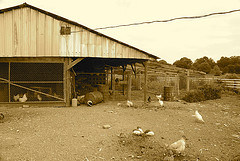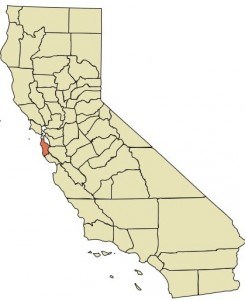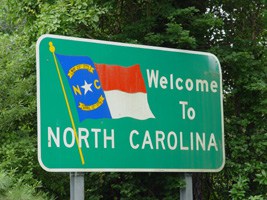I’m a big cable or telephone company and I just caught the smell of broadband stimulus money… hundreds of millions of dollars worth of taxpayer dollars I want for myself and my investors. Why spend their money when I can spend yours? Stop the Cap! warned readers that parties with a vested interest in cashing in on taxpayer funds to construct broadband networks would be sniffing around the Broadband Stimulus package looking for their piece. Broadband Reports, Public Knowledge, and The Wall Street Journal caught a big whiff of telecom trolling for your taxpayer dollars, this time to ostensibly “map” broadband penetration in the United States.
 Using a group called Connected Nation, whose board is packed to the rafters with telecom employees and those serving them (including AT&T, Comcast, and Verizon), telecommunications special interests want the contract (worth $300+ million) to complete the national map. In addition to collecting the nice tidy sum that represents, these companies have a vested interest in keeping broadband looking perky, fast, and available everywhere to forestall regulatory review, municipal broadband initiatives to serve the under served, and hide the fact broadband in the United States is not very competitive, and not very available outside of population centers.
Using a group called Connected Nation, whose board is packed to the rafters with telecom employees and those serving them (including AT&T, Comcast, and Verizon), telecommunications special interests want the contract (worth $300+ million) to complete the national map. In addition to collecting the nice tidy sum that represents, these companies have a vested interest in keeping broadband looking perky, fast, and available everywhere to forestall regulatory review, municipal broadband initiatives to serve the under served, and hide the fact broadband in the United States is not very competitive, and not very available outside of population centers.
The history of this group has demonstrated it has an interest in keeping specifics to a minimum, and inflating broadband penetration levels into the stratosphere. As Broadband Reports wrote, a perfect example is in the state of Kentucky. When independent mapping was completed, it exposed Kentucky had a problem — just 60% of the state had broadband available. Those low numbers might prompt a review of why incumbent telecom companies are not spending some money to wire their less urban customers for service. But with the magic of Connect Kentucky, a sort of regional chapter of Connected Nation, that number jumped to 95% in just five years in a study called dubious, if not outright “methodological malpractice” by Consumers Union.
Broadband Reports writes the 95% penetration rate is “hysterical” in their communications with Kentucky residents and Internet Service Providers. But with a 95% penetration figure, why investigate if there “isn’t a problem?” Of course, you could always pay us (AT&T, Comcast, Verizon, etc.) to improve those networks, also out of taxpayer funds.
Public Knowledge has its own bone to pick with the organization, claiming it demands to keep data general, and often proprietary:
State governments, working months before the stimulus package was conceived, are ramping up their own programs to map deployment of broadband, and are finding they are already increasingly running into conflicts over the type of data they will receive. Some states want comprehensive, granular data. However, they are finding that the telecommunications industry, often represented by Connected Nation (CN), doesn’t want to give it to them. The result is a clash of policy objectives and politics that’s taking place across the country, in states ranging from North Carolina to Alabama, Colorado and Minnesota. Connected Nation’s board of directors is dominated by representatives of large telecom carriers, as CN positions itself as the best choice for states and the Federal government to spend millions of stimulus dollars on broadband mapping.
In North Carolina, the dispute is being played out in a most public way, as Connected Nation, at the behest of a powerful state legislator, has set up a parallel mapping operation to that of the e-NC Authority, a state agency that has been working since 2001 to bring Internet connectivity to rural areas through mapping and through public-private partnerships with telephone companies. While normally Connected Nation can charge hundreds of thousands of dollars for mapping, it is doing the North Carolina map at no cost to the state after a move by the chairman of e-NC’s board to have that organization pay for part of the industry mapping cost failed.
As with all of its mapping, e-NC depends on information from incumbent providers. Through last year and this there was a struggle more prolonged than usual, and the end result was a non-disclosure agreement (NDA) that greatly restricted what the e-NC maps would be able to show.
 Proprietary, non-specific data allows a group to suggest that any speed above dial-up is broadband, and as long as it passes near your neighborhood, you have broadband access (even if you don’t.) That’s precisely the kind of access pointed to by elected officials like Sen. Sam Brownback (R-Kansas) who claim broadband is plentiful and will become more so if the government stays out of it.
Proprietary, non-specific data allows a group to suggest that any speed above dial-up is broadband, and as long as it passes near your neighborhood, you have broadband access (even if you don’t.) That’s precisely the kind of access pointed to by elected officials like Sen. Sam Brownback (R-Kansas) who claim broadband is plentiful and will become more so if the government stays out of it.
To resolve broadband penetration problems, improve competition, and to prevent broadband backwaters served by companies doling out slow, heavily capped access at high prices and calling it a day, truly representative map data must be produced to allow everyone to understand what is currently available at what speeds. Allowing a group like Connected Nation to swipe taxpayer dollars currently used by state officials for honest assessments is a travesty. No company or organization with a vested interest in the outcome should ever be allowed to control a study of this importance. If they do, they’ll find broadband under an anti competitive, slow, and expensive Cap ‘n Tier system is just wonderful for all of us, assuming you even have access to it.
Thanks to Thomas Hawk for the photograph of the fox and “comecloser” for the hen house photo.


 Subscribe
Subscribe



